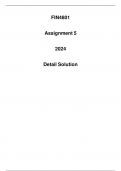FIN4801
Assignment 5
2024
Detail Solution
, a) Impact of Capital Structure Changes on Risk Profile and Expected Return
1. Financial Leverage and Risk Profile:
Financial Leverage: Financial leverage refers to the use of debt to finance the
company’s assets. A higher level of debt increases financial leverage, while a
reduction in debt decreases it.
Impact on Risk Profile: When a company reduces its financial leverage by lowering
its debt levels, as Offices Ltd. plans to do, the risk profile of the company generally
decreases. This is because debt introduces fixed obligations in the form of interest
payments, which can strain cash flows, especially in periods of low profitability or
economic downturns. A reduction in debt lowers the likelihood of financial distress
and bankruptcy, thus reducing the company’s overall risk profile.
Systematic Risk (Beta): The systematic risk of a company, as measured by its
beta, is influenced by its leverage. Beta measures the sensitivity of the company's
returns relative to the market. High leverage amplifies the sensitivity (beta) because
debt magnifies the impact of business risks on equity holders. By reducing debt,
Offices Ltd. is expected to lower its beta from its current level of 1.9, indicating a
decrease in systematic risk relative to the market.
Default Risk: A company with high levels of debt faces increased default risk due to
the obligation to meet fixed interest payments. Lowering debt reduces default risk,
which improves the company’s creditworthiness and might result in lower interest
rates on future borrowings.
2. Expected Return:
Return on Equity (ROE): The return on equity is affected by leverage due to the
difference in cost between debt and equity. With high leverage, the ROE can be
higher during profitable periods due to the tax shield provided by debt (interest
expense is tax-deductible). However, if profitability is low, the high interest costs can
erode returns to shareholders.
Impact of Reduced Leverage on Expected Return: With a reduction in debt,
Offices Ltd. would experience lower interest expenses, which could improve net
income and consequently, the return on equity (ROE). However, the direct impact on
expected return depends on how the market perceives the change in risk. Typically,




